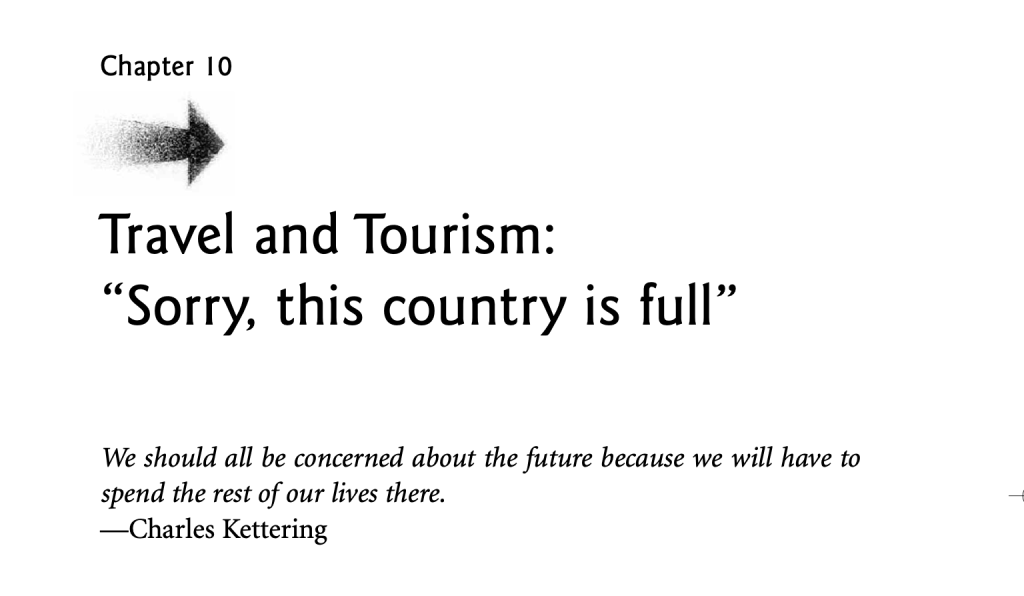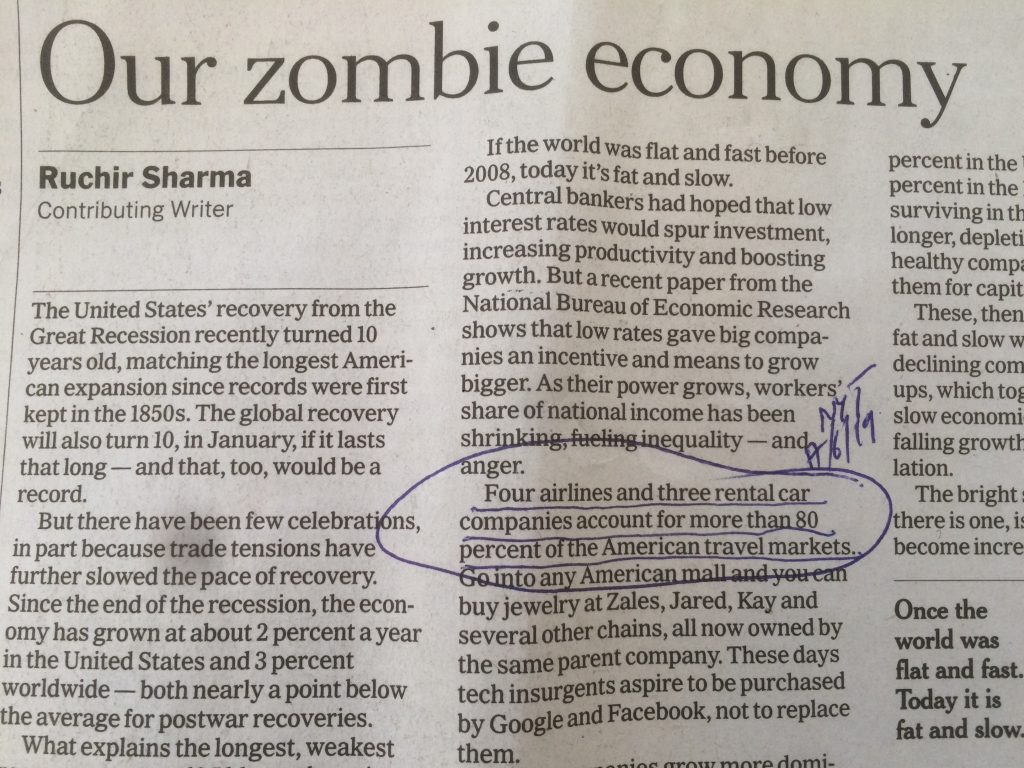The more I think about it, queueing tand booking echnology might be a business to be in?




New York Times 17/6/19
Why do we go on holiday? Logically holidays make no sense. Why leave the comfort, convenience, connectivity of home to travel hundreds, if not thousands, of miles to do what often amounts to very little? The answer is because holidays make us happy. You might say they make us human too.
The impulse to travel links to human inquisitiveness, but also to the need to take a break and discover one’s true self. As Terry Pratchett wrote in A Hat Full of Sky: ‘Why do you go away? So that you can come back. So that you can see the place you came from with new eyes and extra colours…. coming back to where you started is not the same as never leaving.’ This is travel as discovery more than escape, although I suspect that for most people the need to rest and reconnect with themselves is paramount.
The continued popularity of holidaying is a sure sign that in an era defined by upheaval, some things remain remarkably consistent. One might imagine that in times of economic austerity, geo-political turbulence, climate concerns and technological change, the opposite might be the case — that we would all be holidaying at home, in virtual worlds or nowhere at all — but for a great many people this is simply not the case. Despite SARS, Asian Flu, 9/11, oil price shocks, climate change and the eruption of Eyjafjallajökull in Finland, which grounded large parts of the European airline industry, the travel industry has remained remarkably resilient — bouncing back quickly after short-term shocks.
A key reason for this is most probably work. In 2011, nearly 50 per cent of UK adults reported relatively low satisfaction with their work-life balance. A fundamental driver of most holidays is therefore the desire to unwind and escape from work or to get away from ‘life’ for a while. The middle classes probably have the strongest reason to take time off, because they work the longest hours. Full-time managers and senior officials in the UK are paid, on average, for 38.5 hours a week, but actually work for 46.2 hours. (ONS). Hence a need to stop, switch off and get away, even if all we do is drive 500 miles and spend two weeks tethered to work via a digital device.
If the future is fast, volatile, uncertain and full of work, then the desire to get away and digitally detox will presumably grow. The same will broadly be true if families become more atomized via the use of mobile devices, relationships become more virtual and people don’t see their loved ones as often as they’d like. We will all want to invent ways to physically reconnect and bring family and friends back together.
Read Destinations 2030, The Future of Travels & Holidays here.
(Photo: Richard Watson, all rights reserved).
Another day, another trends report and another info-graphic. Here’s a visualisation that references the WTM 2014 travel trends report. Worth a quick look alongside my own future of travel and holidays report.
BTW, I noticed in the newspaper today that someone has invented (so they say) swimmers (sorry, a swim suit) that changes colour when you’ve has enough sun. Similar to my idea about sun cream that did the same thing (which our nightmare client thought was a ridiculous idea).
If you’re lying on a beach, or around a pool, in the northern hemisphere, here’s some holiday reading – a report on the future of holidays and travel. Click on this link.
Here’s a link to a soft copy of “Destinations 2030” – the travel trends report I spoke about a little while ago. Link here.
10 holiday ideas for the future
1. Your mobile is your passport
It’s also your boarding pass, immigration forms etc.
2. Suncream for oldies
There is sun cream for all skin types, sun conditions and even babies. Why not sun cream for those aged 65+? It changes colour when you’ve had enough sun.
3. Digital deckchairs
Built in sleep/sun exposure timer, sensors and GPS so it knows when it’s not being used (and holiday makers can locate it using a smart phone), sockets to charge mobile devices. Future versions could change shape according to body size and weight.
4. Augmented reality sunglasses
Tells you who other people on the beach are using facial recognition. Can also overlay historical facts about places; show reviews for local cafes and bars, display maps and so on.
5. Tech-free tourism
Zoned ‘No Internet’ hotel floors (the joys of disconnection). Older hotels could also be sold to customers on the basis that they do NOT have Internet or Wi-Fi connections.
6. Holiday finance
Loans and easy payment terms for holidays. We take out secured loans for home improvements and cars, why not for our leisure?
7. Weather insurance for individual holidaymakers
“Spread bet” insurance – you pay for a policy and receive a payment for each day it rains or alternatively pay extra on your premium when the sun shines
8. Tourist Toggs
You fly without check-in bags, but your clothes are already at the resort – either they are sent in advance or you select what you need online and the hotel buys them for you. At the end of the holiday you can either have them washed and sent home (again no checked baggage) or donate them to local people in need.
9. Pay per kilo flights
The airline ticket cost depends on the combined weight of you and your luggage – another incentive to get serious about that pre-holiday diet.
10. Luggage with GPS fitted
So it/you knows where it is (no more lost bags). Can include a self-weighing facility and motorised wheels and guidance system so it can follow you around the airport and send an SOS to your mobile if you board a plane to Hawaii and it’s in a hold bound for Hanoi.
This is the eleventh and final post on the future of travel and holidays. If you would like a free pdf of the whole report – called Destinations 2030 – this will be available from next week. Please get in touch via “comments” below to reserve your copy.
Key Trends for the Future of Travel & Holidays
1. Mobile me
In future everyone’s life will be carried in the palm of the hand. Access to information will define you and personal technology will be an ever-present companion – at home and on holiday. Wearable computing will be the norm.
Even more than today we will be “always on”, with technology providing a “sixth sense” in our lives, allowing us to operate as virtual beings. We will use mobile phones (which almost certainly will not look like the phones of today) to communicate, to inform our selves in real time about the world around us, to document the minutiae of our lives and above all to manage our finances. Ultimately, micro-technology will be embedded in our bodies.
2. Personalisation
The personalisation of everything will be the norm. The more of our data we submit to organisations, the more they will be able to tailor to our needs – whether they are ones we know about or not. The availability of 3-D printing, allied to higher level personal computing will allow us to be designers, creators and curators of our possessions and our surroundings. From mass production, to mass customisation, to micro-personalisation we will be able to express our individuality in every facet of our lives and this will include our holidays.
3. Flexibility
As our lives become more unpredictable, the more we will demand flexibility in every aspect of our lives – starting with the fundamentals. Our careers will be increasingly portfolio as we assemble a collage of skills. We may have returned to being a rental economy in our housing. We will see modular cars as the norm (and probably with short-term lease, rather than buy). As our working hours become more erratic (possibly with the expansion of “zero hours” into middle class life), we will become short-termist in our planning and this will include holidays.
We will expect to be able to change our minds up to the last minute, combine disparate destinations, alter our party make up and design, barter and bargain for deals. The challenge for companies will be to not just respond, but embed flexibility into every aspect of their offers.
4. Premiumisation
As we aspire to express our individuality, we can anticipate a future where premiumisation exists in every market. Having been told for years “you’re worth it”, we will come to believe it. Information accessibility will give us the tools to research and demand constant product and service improvements. Companies will have to be more transparent in every aspect of their offers and we will pick and choose the modular make – up of our lives. In our holidays we will want the option to upgrade everything. Exclusivity will be sought at every stage of the process. We will not just pay for quality, but also for scarcity and rareness. Time, space, solitude will be aspirational as we live in a more crowded and full on world.
5. (Re)connection
In the future we will be alone together. We will live fragmented lives in a digitally joined up world. Nuclear families will have become atomised, we be worried about work/life balance and we will struggle to distinguish between both. While some will thrive on stress, it will begin to be seen as a killer disease. Holidays will, as never before, offer an antidote to this for many. A rare opportunity for real time, rather than virtual, connection with friends, family and ourselves.
6. Discovery
While sea, sun and sand will continue to be the main ingredient in many holidays, a growing number of us will have a nagging desire for more significant experiences. We may want to discover unfamiliar countries, get a fleeting feeling of being an insider and part of a different type of community. Adventure with a small or large ‘a’ will be part of the mix of future holidays. For families in particular, exploration will have to be safe and from trusted providers. We may be looking to expand our mental horizons, absorb culture and learning. Agri-tourism and eco-tourism are just a couple of examples. Increasingly we will want to return from our holidays as different people – more experienced, more rounded – and not just in the waistline.
7. Simplification
If we think we are subject to information overload now, the future has the potential to boggle our minds. Services that make our lives easier, that know or can intuit our preferences and take the burden of decision making from us will be prized. Brands that we can trust to know us better than we know ourselves, that act as avatars and filters, will be rewarded with loyalty and bonding. We will seek out experiences that are pared down to their bare essentials as an antidote to complexity. A new cult of minimalism. In holidays, access to peace will be as precious to some as access to premium services. We may be prepared to pay to be deprived of technology, just to have a few hours away from screens in techno – retreats. Escape will be rare, hard to find and either extremely primitive and cheap, or extremely cushioned and expensive.
List by Richard Watson and Andrew Crosthwaite.
To be continued…